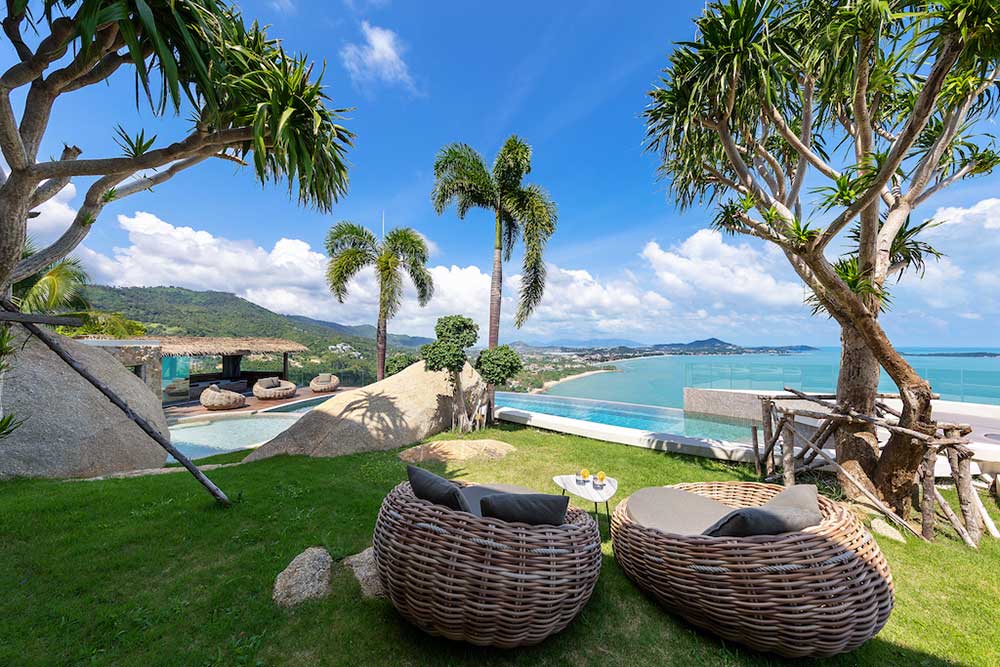From an agent’s perspective, when we take a step back to look at the market, property sales on Koh Samui in 2025 are showing resilience, despite the challenging environment in which we operate. It’s not just global volatility, but more importantly, ongoing uncertainty surrounding the legal ownership for foreign investors of freehold landed property.
What we’re seeing, however, is a growing difficulty in actually transacting freehold villa sales to foreign buyers. In this article, we explore to what extent this can now be considered a liquidity crisis.
Property sales in Koh Samui are largely driven by lifestyle, investment buyers and second home buyers, fed by a strong and growing tourism sector. Demand is closely tied to the island’s appeal as both a short-term destination and a long-stay, second-home base for overseas buyers.
Tourist numbers for Koh Samui have risen steadily each year since the recovery from the pandemic, and according to C9 Hotelworks (source: Samui Hotel & Tourism Market Review, June 2025), tourist arrivals to the island for Q1 this year were up 9% compared to the same period in 2024. The strong tourist sector has translated into continued demand for properties on Koh Samui.
However, despite this demand backdrop, the market for freehold villas has been dampened by increasing ownership restrictions and legal uncertainties, particularly affecting the private resale segment. That said, we need to acknowledge the pent-up demand waiting on the sidelines. With greater legal clarity and viable long-term ownership structures, the ability to transact cleanly can be restored relatively quickly.
Explore our full selection of Koh Samui villa and property for sale
Legal Uncertainty and Buyer Confidence
This isn’t just a problem for properties held in corporate structures, although those are clearly the most affected due to growing uncertainty over nominee rules and potential enforcement. The broader issue is that any villa seller in Koh Samui targeting foreign buyers is now facing a liquidity problem, regardless of how the property is held.
It’s no longer just about whether a property is legally compliant, it’s about whether it can be confidently acquired.
The Rise of Leasehold Alternatives
Another important factor is that the resale market in Koh Samui was already under pressure from a wave of discounted off-plan inventory. Now, that competition has become more acute, because many new developments are being structured with renewable leaseholds specifically designed for foreign buyers. By contrast, most private owners of villas, notably those held via Thai companies, cannot easily offer a clean, renewable leasehold structure. In theory, a lawyer could step in to become a lessor and construct a lease agreement, but the reality is that these solutions are often complicated, opaque, and off-putting for buyers. The question is obvious: why should something as simple as buying a villa require a workaround at all?
Developers Call for Ownership Reform
From the perspective of an agent who has been marketing property in Thailand to overseas buyers for many years, the need, and given the current wave of enforcement, the urgency, for new legal structures that offer secure, long-term ownership of villas, apartments, and land is patently obvious. But this is no longer just the view of brokers working with foreign clients. Increasingly, Thai developers themselves are calling for the same thing.
In June 2025, SC Asset Corporation – one of Thailand’s largest listed developers – publicly advocated for leasehold terms to be extended to at least 60 years in order to attract international buyers. Speaking to the Bangkok Post, CEO Nuttaphong Kunakornwong described extended leaseholds as a potential “game-changer” for Thailand’s property sector and urged policymakers to move beyond piecemeal incentives and take bold, targeted steps to unlock foreign demand. He specifically identified international real estate investment as a key lever for economic growth and argued that restoring long-term confidence for foreign buyers should be a national strategy, not just a housing policy.
Source: Bangkok Post – SC Asset Corporation touts extending foreign leaseholds, 18 June 2025
This level of commentary from a major domestic developer underscores the core point of this article: the current legal environment is not just limiting ownership options; it’s impeding liquidity across the resale market. And unless there is clear progress toward viable long-term ownership solutions, both individual transactions and broader market momentum will remain constrained.
Why Samui’s Property Mix Leaves It More Exposed
Koh Samui has always had a high percentage of lifestyle buyers, many of whom favour privacy, space, and villas or houses over other types of property. This characteristic helped the market perform well in the years following the COVID-19 pandemic, as lifestyle-driven buyers became a more dominant force in international real estate.
However, that same dynamic also means that property supply on Koh Samui is disproportionately weighted toward villas and houses. Even though many villas are now marketed by developers using leasehold ownership, the vast majority of private (standalone and not part of a communal development) villas and houses have been acquired by foreign buyers using corporate holding structures. The island has very few branded residences, only a limited number of freehold condominium projects, and a relatively small share of large-scale or institutional developers whose reputation offers meaningful security when it comes to lease renewals.
Consequently, Koh Samui is particularly exposed if ownership of freehold landed properties via Thai companies is no longer a viable option for the vast majority of foreign buyers. Put simply, the market for Koh Samui villas and houses, particularly resale stock, is extremely vulnerable to the current clampdown on company-based foreign ownership.
Structural Limitations at Low to Mid-Range Price Points
The segment most acutely affected is resale villas held by foreign owners in company structures. Turnover is noticeably slower, buyer hesitation is high, and transactional liquidity has clearly declined. This is most pronounced at lower price points: for properties listed between 5 million and 10 million THB, the legal and administrative costs of setting up a new, fully compliant company, or restructuring an existing one to permit takeover, are often too high to justify the investment.
However, the problem is not just limited to affordability. Even at higher price points, where buyers can more easily absorb the costs of company formation, the legal viability of using a Thai company is now limited. To be compliant, a company must not use nominee shareholders, and it must operate as a profit-making enterprise, not simply as a holding vehicle. These conditions are difficult to satisfy and have further eroded confidence in company-based ownership.
In parallel, a growing number of buyers are delaying decisions entirely, waiting to see if any changes to the legal framework will materialise.
What Comes Next?
Anyone who works in marketing property in Thailand to overseas investors will tell you that a change in the law to permit simple and secure long-term ownership, not only of villas, houses, and land, but also apartments, is long overdue. And because corporate holding structures are generally no longer viable, a solution is now more urgent than ever. The proposed reform to increase lease terms from 30 years to 99, announced by the government in 2024, would undoubtedly restore investor confidence and have a significant positive effect on freehold villa and house sales in Koh Samui. Until this change, or something similar, is enacted, much of the foreign demand for freehold villas is likely to remain on hold.



